The Spiritual Meaning of a Monkey: A Comprehensive Guide
Introduction to the Spiritual Symbolism of Monkeys
Monkeys have intrigued humans for centuries, symbolizing traits that range from intelligence and agility to mischief and playfulness. Their unique characteristics have made them prominent figures in mythology, religion, and cultural symbolism worldwide. Exploring the spiritual meaning of a monkey opens doors to understanding their deeper role in human life, including lessons of adaptability, social connection, and emotional intelligence.
Historical Significance of Monkeys in Various Cultures
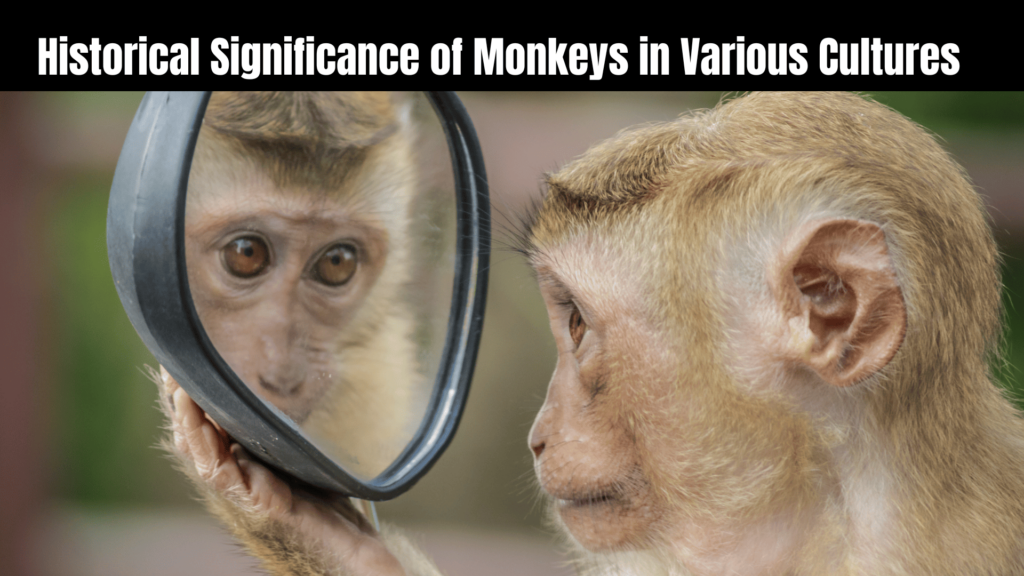
Monkeys have been revered, feared, and symbolized in unique ways across different cultures throughout history. Their human-like behavior, intelligence, and agility make them powerful symbols and central figures in myths, legends, and spiritual teachings.
Monkeys in Ancient Asian Cultures
- China:
In Chinese folklore, monkeys often symbolize cleverness and mischief. The most iconic figure is the Monkey King, Sun Wukong, from the epic novel Journey to the West. He represents intelligence, strength, and rebellion, often celebrated for his ability to outsmart even the gods. Monkeys in Chinese zodiac astrology also carry significance, embodying traits like versatility, wit, and curiosity. - India:
Monkeys hold a sacred place in Indian culture, particularly in Hinduism. Lord Hanuman, the monkey god, is a central figure in the Ramayana. Known for his devotion, strength, and wisdom, Hanuman symbolizes unwavering faith and courage. He is also seen as a protector and is worshipped for blessings of power and perseverance.
Monkeys in African Traditions
In African folklore, monkeys often play the role of tricksters. They embody intelligence, cunning, and adaptability. These stories often convey moral lessons, teaching the value of resourcefulness and the pitfalls of arrogance. Some tribes view monkeys as spiritual beings that bridge the human and natural worlds.
Monkeys in Indigenous American Cultures
Among indigenous groups in Central and South America, monkeys are seen as guardians of the forest and guides to the spiritual world. For the Maya civilization, monkeys were associated with creativity and art, often representing scribes, musicians, and craftsmen. Their playful nature was linked to joy and celebration.
Monkeys in European History
In medieval Europe, monkeys were symbolic of human folly and vice. They appeared in art and religious contexts as representations of greed, vanity, or deception. During the Renaissance, the perspective shifted slightly, with monkeys depicted as curious and intelligent beings, often serving as metaphors for human ambition and the pursuit of knowledge.
Monkeys in Modern Culture
Today, monkeys are seen as symbols of playfulness, creativity, and adaptability. In literature and media, they often appear as intelligent and resourceful characters, embodying a blend of humor and wisdom. They also serve as reminders of our evolutionary ties to the animal kingdom and our responsibility to protect wildlife.
Key Traits of Monkeys and Their Spiritual Implications
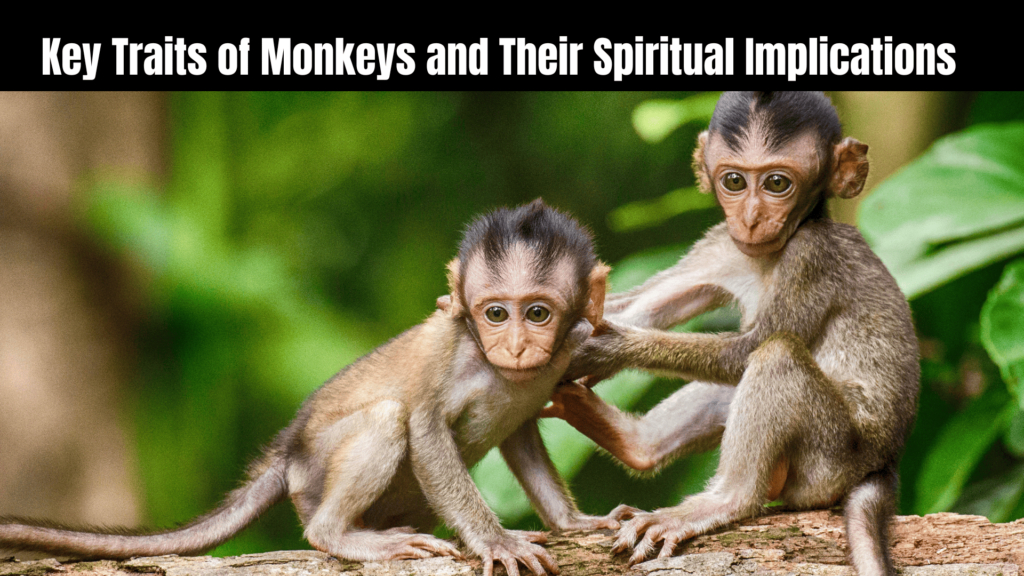
Monkeys, with their unique characteristics and behaviors, have fascinated humans for centuries. Their physical agility, intelligence, and social nature resonate deeply, often reflecting human qualities. In spiritual and symbolic contexts, these traits carry profound meanings.
1. Intelligence and Problem-Solving
Monkeys are known for their remarkable intelligence and problem-solving abilities. They exhibit creativity, adaptability, and a sharp sense of awareness.
- Spiritual Implications:
Intelligence in monkeys is often linked to wisdom and the pursuit of knowledge. They remind us to approach life’s challenges with curiosity and adaptability, symbolizing the importance of continuous learning and the power of resourcefulness.
2. Playfulness and Joy
Monkeys are highly social animals known for their playful antics and exuberant energy. Their ability to find joy in simple activities reflects a carefree spirit.
- Spiritual Implications:
This trait symbolizes the value of embracing joy, spontaneity, and lightheartedness in life. Monkeys encourage us to find balance by incorporating play and laughter into our routines, emphasizing the need to live in the moment.
3. Agility and Movement
Monkeys are agile climbers, effortlessly navigating trees and landscapes. Their physical flexibility mirrors their ability to adapt to changing environments.
- Spiritual Implications:
Agility represents resilience and adaptability in the spiritual sense. Monkeys teach us to move through life’s obstacles with grace, embracing change and maintaining balance in the face of adversity.
4. Social Connections and Community
Monkeys thrive in complex social structures, showing strong bonds with their groups. They often work together to ensure survival and well-being.
- Spiritual Implications:
This trait highlights the importance of relationships and community. Monkeys inspire us to nurture our connections, value teamwork, and offer support to those around us.
5. Curiosity and Exploration
Monkeys are naturally curious, always exploring their surroundings and seeking new experiences. Their inquisitiveness reflects an innate desire for growth and discovery.
- Spiritual Implications:
Curiosity symbolizes the quest for self-discovery and spiritual enlightenment. Monkeys encourage us to remain open-minded and explore new perspectives, fostering personal and spiritual growth.
6. Mischievousness and Trickery
Monkeys often display mischievous behavior, challenging norms and pushing boundaries. While this may seem disruptive, it carries deeper symbolic meaning.
- Spiritual Implications:
Mischief represents the idea of breaking free from limitations and questioning established rules. Monkeys remind us to challenge conventional thinking and embrace creativity while maintaining ethical responsibility.
7. Protective Instincts
Monkeys are fiercely protective of their young and their group. Their defensive behavior showcases their commitment to safeguarding their loved ones.
- Spiritual Implications:
Protection signifies loyalty, devotion, and selflessness. Monkeys inspire us to protect what matters most, whether it’s our family, values, or spiritual path.
Monkeys as Spirit Animals
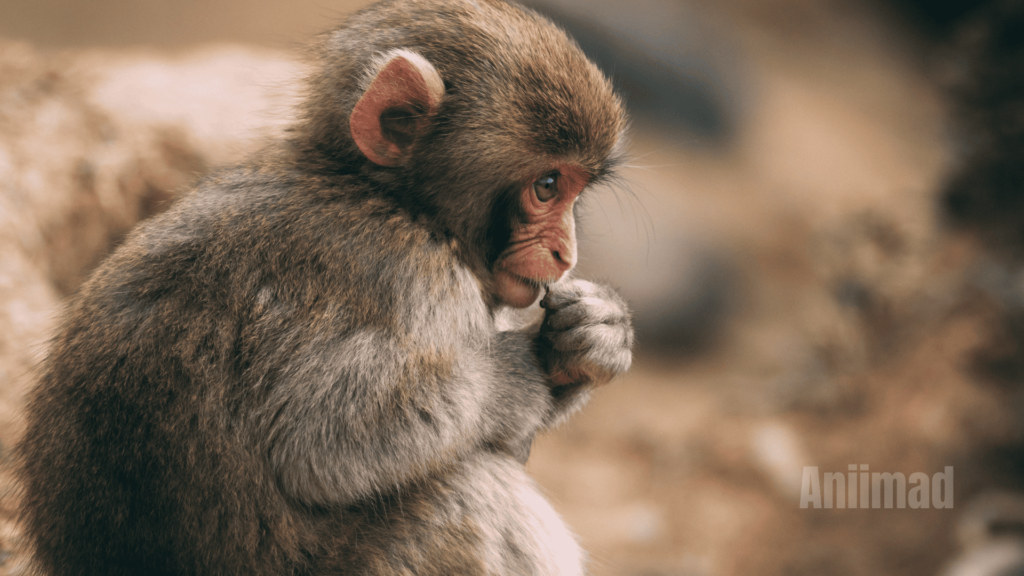
In spiritual traditions, animals are often seen as guides that offer wisdom and insights into our lives. The monkey, as a spirit animal, embodies playfulness, curiosity, intelligence, and adaptability. When the monkey appears as a spirit guide, it encourages us to embrace these qualities and apply them to our personal and spiritual journeys.
Symbolism of the Monkey Spirit Animal
- Playfulness and Joy
Monkeys are known for their lighthearted and playful nature. As a spirit animal, the monkey encourages us to approach life with joy and a sense of humor, reminding us not to take things too seriously. It symbolizes the importance of balancing responsibilities with moments of laughter and spontaneity. - Curiosity and Exploration
The monkey spirit animal inspires a natural curiosity about the world. It urges us to explore new opportunities, ask questions, and seek growth. This trait highlights the importance of keeping an open mind and embracing new perspectives. - Adaptability and Agility
Monkeys navigate challenging environments with ease, demonstrating agility and resilience. As a spirit guide, the monkey teaches us to adapt to change, overcome obstacles, and find creative solutions in difficult situations. - Social Connection and Relationships
Monkeys are highly social creatures that thrive in close-knit groups. They emphasize the value of community, cooperation, and maintaining strong bonds with loved ones. The monkey spirit animal encourages us to nurture our relationships and seek harmony within our social circles. - Intelligence and Problem-Solving
Known for their cleverness, monkeys often represent intelligence and resourcefulness. As a spirit animal, the monkey inspires us to use our intellect and creativity to tackle challenges and achieve our goals. - Mischief and Playful Disruption
Monkeys are sometimes associated with trickery and mischief. While this might seem negative, it can be a positive force that challenges us to think differently, break free from routine, and approach life with a fresh perspective.
When the Monkey Spirit Animal Appears
The appearance of a monkey as a spirit animal can signify a time to reassess how we approach life. It often appears when:
- We need to bring more joy and laughter into our lives.
- A challenge requires adaptability or out-of-the-box thinking.
- We are called to explore new ideas or opportunities.
- It’s time to strengthen our relationships or rebuild social connections.
- We must let go of rigidity and embrace spontaneity.
Lessons from the Monkey Spirit Animal
- Balance Work and Play: The monkey reminds us that life is not just about responsibilities. It’s essential to take time for fun, relaxation, and creative expression.
- Stay Curious: Cultivate a sense of wonder about the world, explore new paths, and be open to learning.
- Adapt to Change: Embrace change as a natural part of life and use it as an opportunity to grow.
- Foster Community: Strengthen bonds with friends, family, and colleagues to create a support system.
- Think Creatively: Use intelligence and resourcefulness to overcome challenges and achieve success.
Monkeys in Dreams: Spiritual Interpretations
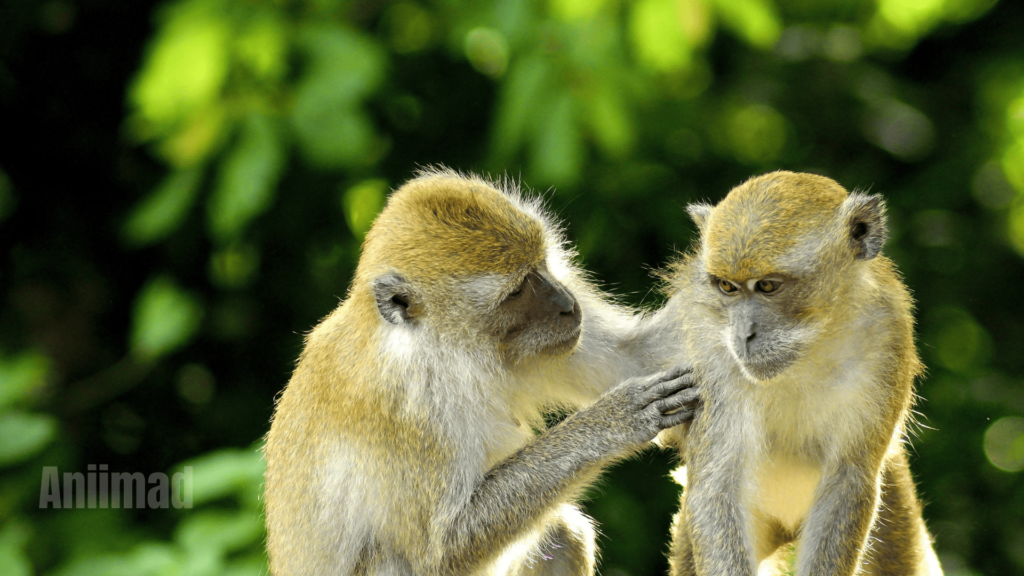
Dreams about monkeys can carry profound spiritual meanings, often reflecting aspects of our inner selves, emotions, and spiritual growth. Monkeys in dreams are symbolic of playfulness, adaptability, intelligence, and sometimes mischievous behavior. Understanding the spiritual implications of these dreams can provide valuable insights into our lives and guide us on our spiritual journey.
1. General Symbolism of Monkeys in Dreams
Monkeys in dreams often represent the playful and curious side of our nature. Their presence may indicate a need to reconnect with our sense of wonder and spontaneity. Alternatively, they might signify cleverness, adaptability, or even trickery, depending on the context of the dream.
- Spiritual Meaning: A monkey in a dream suggests the need to balance seriousness with lightheartedness and encourages exploring creative and innovative solutions to life’s challenges.
2. Playing Monkeys
Dreaming of monkeys playing is a sign of joy, freedom, and the need to embrace a more carefree attitude. It can also signify a desire for fun and relaxation in a life dominated by responsibilities.
- Spiritual Interpretation: Such dreams remind us to nurture our playful spirit, let go of stress, and live in the present moment.
3. Aggressive or Mischievous Monkeys
If the monkey in your dream is aggressive or causing trouble, it may symbolize inner conflicts, unresolved issues, or chaotic emotions. It could also point to someone in your waking life whose behavior is unpredictable or disruptive.
- Spiritual Meaning: This type of dream serves as a warning to address areas of your life where you feel out of control. It also suggests the importance of mindfulness and self-discipline.
4. Caring for a Monkey
Dreaming of taking care of a monkey indicates a nurturing side of your personality and the desire to provide for others. It may also reflect personal growth and the development of empathy and compassion.
- Spiritual Interpretation: This dream symbolizes your role as a protector and guide in your community or relationships. It highlights the importance of caring for those around you.
5. Monkeys Swinging or Climbing
Monkeys swinging through trees or climbing represent agility, progress, and the ability to overcome obstacles. These dreams often indicate that you are navigating a challenging period with resilience and determination.
- Spiritual Meaning: Such dreams inspire confidence and encourage you to adapt to new situations with ease, reminding you of your inner strength and creativity.
6. Group of Monkeys
Seeing a group of monkeys in your dream may symbolize your social connections, relationships, or interactions with others. It can reflect feelings of unity or, conversely, conflicts within a community.
- Spiritual Interpretation: This dream urges you to evaluate your relationships, prioritize meaningful connections, and foster harmony in your social circles.
7. Monkey Eating Food
A dream where a monkey is eating food may signify abundance, contentment, and satisfaction in your waking life. It can also represent the need to nourish yourself physically, emotionally, or spiritually.
- Spiritual Meaning: The act of eating symbolizes sustenance and growth. This dream encourages you to seek balance and fulfillment in all areas of your life.
8. Monkey Escaping or Running Away
If the monkey in your dream is escaping or running away, it could indicate feelings of loss, missed opportunities, or the need to let go of something or someone in your life.
- Spiritual Interpretation: This dream is a call to release attachments, embrace change, and trust in the journey ahead.
Monkey Symbolism in Religion and Spiritual Texts
Monkeys have held a significant place in religious and spiritual texts across various cultures for centuries. Their symbolic meanings often intertwine with themes of wisdom, mischief, adaptability, and devotion. By examining these meanings in the context of religious narratives and spiritual philosophies, we can better understand the depth and richness of their symbolism.
1. Monkeys in Hinduism
In Hinduism, monkeys are revered through the figure of Hanuman, one of the most iconic deities. Hanuman, the monkey god, symbolizes devotion, strength, loyalty, and selfless service.
- The Ramayana: Hanuman plays a pivotal role in this ancient epic, aiding Lord Rama in his quest to rescue Sita. His unwavering faith, intelligence, and courage make him a symbol of dedication and humility.
- Spiritual Lessons: Hanuman teaches the importance of surrender to divine will, detachment from ego, and the power of devotion in overcoming life’s obstacles.
- Worship and Festivals: Hanuman Jayanti, a festival dedicated to Hanuman, celebrates his divine qualities and his influence in guiding human souls toward spiritual enlightenment.
2. Monkeys in Chinese Mythology
In Chinese mythology, monkeys are often portrayed as clever, mischievous, and resourceful figures. The legendary Monkey King, Sun Wukong, from the classic novel Journey to the West, exemplifies these traits.
- Sun Wukong’s Symbolism: As a character, Sun Wukong embodies rebellion, transformation, and the quest for immortality. Despite his trickery, his journey reflects the pursuit of enlightenment and self-awareness.
- Spiritual Implications: Monkeys in Chinese culture often represent adaptability, intelligence, and the importance of perseverance in achieving spiritual and personal growth.
3. Monkeys in Buddhism
In Buddhist texts, monkeys serve as both positive and negative symbols, depending on the context.
- Positive Symbolism: Monkeys sometimes represent playfulness and agility, qualities that can help navigate the complexities of life.
- Negative Symbolism: The “monkey mind” is a common metaphor in Buddhism, describing the restless, distracted, and untamed nature of human thoughts. This concept highlights the need for mindfulness and meditation to calm the mind and achieve spiritual clarity.
- Jataka Tales: Monkeys frequently appear in these moral stories, often teaching lessons about compassion, wisdom, and karma.
4. Monkeys in Ancient Egyptian Mythology
In Ancient Egypt, monkeys were associated with the gods and often depicted in religious art and hieroglyphs.
- The God Thoth: Baboons, a type of monkey, were linked to Thoth, the god of wisdom, writing, and knowledge. They were considered sacred animals that represented intellectual pursuits and spiritual enlightenment.
- Funerary Symbolism: Baboons were also believed to guide souls in the afterlife and were depicted in tomb art as protectors and guides for the deceased.
5. Monkeys in African Spiritual Traditions
In many African cultures, monkeys are viewed as tricksters or intermediaries between the human and spiritual worlds.
- The Trickster Archetype: Monkeys embody cunning and resourcefulness, often teaching moral lessons through their cleverness and humor.
- Spiritual Role: They serve as reminders of the duality of human nature—our ability to create and destruct, to be wise and foolish.
6. Monkeys in Christianity and Medieval Symbolism
In medieval Christian art and literature, monkeys were often used as symbols of human folly and sin.
- Representation of Sin: Monkeys sometimes symbolized greed, lust, and vanity, reflecting the moral failings of humankind.
- Moral Lessons: Their depiction served as a cautionary reminder to resist earthly temptations and strive for spiritual purity.
7. Monkeys in Mayan and Aztec Cultures
In Mesoamerican traditions, monkeys were often associated with art, dance, and creativity.
- Mayan Mythology: Monkeys were linked to the gods of writing and the arts, emphasizing their role as creators and storytellers.
- Aztec Beliefs: Monkeys were seen as playful beings that embodied joy and spontaneity, but also as reminders of humanity’s primal instincts.
Monkeys and Chakras: A Unique Connection
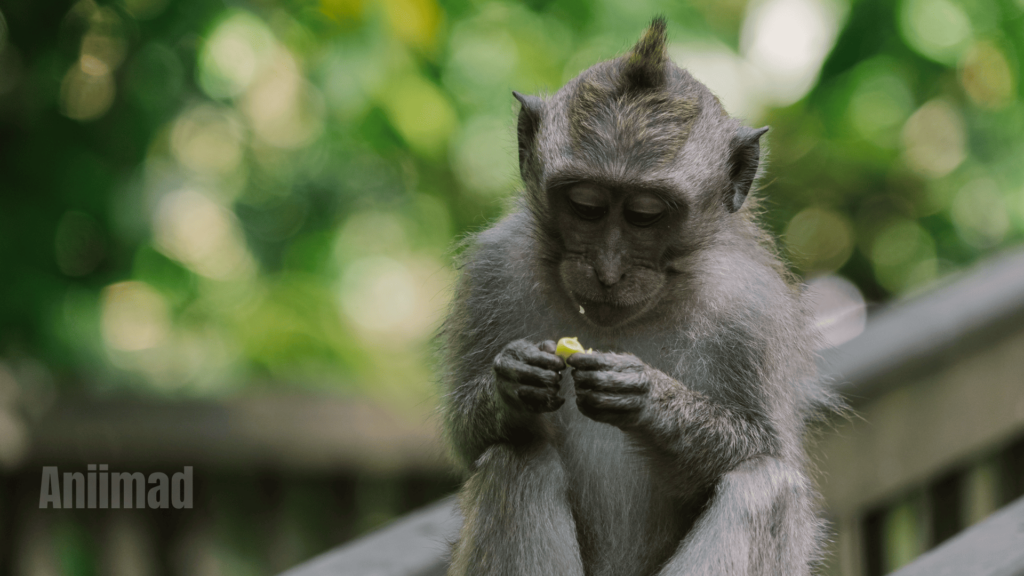
Monkeys, as vibrant and intelligent creatures, hold deep spiritual symbolism that resonates with the concept of chakras in spiritual traditions. Chakras, the energy centers in the body, are believed to govern physical, emotional, and spiritual well-being. Monkeys, with their dynamic energy, adaptability, and symbolic meanings, are often associated with various aspects of the chakra system. This unique connection offers valuable insights into understanding energy flow, personal growth, and spiritual balance.
1. The Root Chakra (Muladhara) and Grounding Energy
The root chakra represents stability, security, and grounding. Monkeys, particularly their connection to the earth as tree-dwelling creatures, embody the importance of being rooted in the present.
- Symbolic Connection: Monkeys rely on their agility and strength to navigate their environments. Similarly, the root chakra encourages a strong foundation for life’s challenges.
- Lessons from Monkeys: Their resourcefulness reminds us to address basic needs and cultivate a sense of safety and belonging.
2. The Sacral Chakra (Svadhisthana) and Creative Expression
The sacral chakra governs creativity, emotions, and sensuality. Monkeys’ playful and curious nature reflects the energy of this chakra.
- Symbolic Connection: Their joyous exploration of their surroundings mirrors the sacral chakra’s association with freedom and emotional expression.
- Lessons from Monkeys: Monkeys inspire embracing creativity, playfulness, and the flow of life’s experiences without inhibition.
3. The Solar Plexus Chakra (Manipura) and Personal Power
The solar plexus chakra represents personal will, confidence, and inner power. Monkeys’ boldness and high energy levels resonate strongly with this chakra.
- Symbolic Connection: Monkeys exhibit a strong sense of self-assuredness and adaptability, qualities that align with a balanced solar plexus chakra.
- Lessons from Monkeys: Their dynamic energy encourages self-confidence and the courage to face life’s challenges with determination.
4. The Heart Chakra (Anahata) and Compassion
The heart chakra symbolizes love, compassion, and connection. Monkeys, known for their social bonds and nurturing behavior, embody the essence of this chakra.
- Symbolic Connection: Monkeys thrive in communities, showcasing care and cooperation, which reflect the harmonious energy of the heart chakra.
- Lessons from Monkeys: They teach the importance of fostering empathy and building strong relationships based on mutual support and understanding.
5. The Throat Chakra (Vishuddha) and Communication
The throat chakra is associated with self-expression and communication. Monkeys’ vocalizations and intricate social interactions highlight their connection to this energy center.
- Symbolic Connection: Monkeys communicate effectively within their groups, emphasizing the importance of clear and honest expression.
- Lessons from Monkeys: Their communicative abilities inspire us to speak our truths and listen actively to others.
6. The Third Eye Chakra (Ajna) and Intuition
The third eye chakra governs intuition, wisdom, and perception. Monkeys’ intelligence and problem-solving abilities resonate with the essence of this chakra.
- Symbolic Connection: Monkeys demonstrate sharp awareness and adaptability, reflecting the heightened intuition associated with the third eye chakra.
- Lessons from Monkeys: They remind us to trust our inner wisdom and approach challenges with clarity and foresight.
7. The Crown Chakra (Sahasrara) and Spiritual Enlightenment
The crown chakra represents spiritual connection and higher consciousness. Monkeys’ playful and adventurous nature hints at the joy and freedom found in spiritual awakening.
- Symbolic Connection: Monkeys’ ability to swing between trees symbolizes the transcendence and fluidity of a balanced crown chakra.
- Lessons from Monkeys: They encourage us to embrace life’s mysteries with an open heart and a light spirit, fostering a deeper connection to the divine.
FAQs: Answering Common Questions
What does a monkey symbolize spiritually?
Monkeys symbolize intelligence, adaptability, playfulness, and social connections, offering lessons in resilience and community.
How do monkeys teach us about community?
By observing monkeys’ strong social bonds, we learn the value of teamwork, mutual support, and the importance of building meaningful relationships.
What does it mean to dream about a monkey?
Dreaming of monkeys often reflects a need for adaptability, lightheartedness, or introspection about unresolved emotions.
Are monkeys considered sacred animals?
Yes, in many cultures and religions, monkeys are revered as sacred symbols of wisdom, devotion, and spiritual energy.
How can I connect with the energy of the monkey spirit animal?
You can connect with the monkey spirit animal by meditating on its traits, observing monkeys in nature, or incorporating playful and creative practices into your life.
What role do monkeys play in spiritual healing practices?
Monkeys’ playful and curious nature inspires emotional healing, helping individuals overcome rigidity and embrace a more open-minded approach to life.
Conclusion: Embracing the Spiritual Lessons of Monkeys
The spiritual meaning of a monkey encompasses wisdom, adaptability, joy, and community. By embracing these lessons, we can navigate life with greater resilience and positivity, finding balance and fulfillment in our journeys.